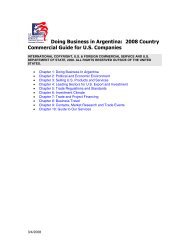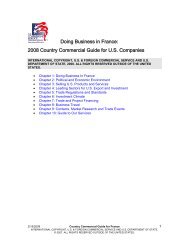Doing Business In Saudi Arabia - Bna
Doing Business In Saudi Arabia - Bna
Doing Business In Saudi Arabia - Bna
You also want an ePaper? Increase the reach of your titles
YUMPU automatically turns print PDFs into web optimized ePapers that Google loves.
accordance with the requirements defined in the Ministry's Resolution 264 from 1982.<br />
These regulations, in theory, permit the registration of <strong>Saudi</strong>-foreign joint venture<br />
consulting firms. As part of its WTO accession commitments, <strong>Saudi</strong> <strong>Arabia</strong> generally<br />
allows consulting firms to establish an office in <strong>Saudi</strong> <strong>Arabia</strong> without a <strong>Saudi</strong> partner.<br />
However, offices practicing law, accounting and auditing offices, design, architectural,<br />
and engineering, civil planning, healthcare services, dentistry, and veterinary services,<br />
must have a <strong>Saudi</strong> partner; the foreign partner’s equity cannot exceed 75 percent of<br />
the total investment.<br />
<strong>In</strong> 2002, the Supreme Economic Council announced the approval of a privatization<br />
strategy and procedures, sectors on offer to domestic and foreign investors, and a<br />
timetable to transfer certain public services to the private sector. 20 state-owned<br />
companies handling water and drainage; saline water desalination;<br />
telecommunications; mining; power; air transportation and related services; railways;<br />
some sectors of roadways; post services; flour mills and silos; seaport services;<br />
industrial cities services; government portions of SABIC, banks, and local refineries;<br />
government hotels; sports clubs; some municipality services; some educational<br />
services; some social services; some agricultural services; and some health services<br />
were slated for privatization.<br />
As a result of the privatization strategy, the <strong>Saudi</strong> Telecommunications Company<br />
(STC) floated a minority stake (approximately 20%) on the stock market in January<br />
2003, netting close to $4 billion in proceeds. An additional 10% has since been<br />
offered for private ownership. The initial public offering of 50% of the formerly stateowned<br />
National Company for Cooperative <strong>In</strong>surance (NCCI) was completed in<br />
January 2005. The first SABIC offering went public on December 17, 2005 for 35<br />
percent of the newly-formed Yanbu National Petrochemical Company (YANSAB),<br />
capitalized at $1.5 billion. YANSAB will be SABIC’s largest petrochemical complex<br />
and the IPO represents $533 million of the company’s capital.<br />
<strong>In</strong> July 2003, the government took significant, long-awaited steps to lower the<br />
corporate tax rate on foreign investors to a flat 20%; however, separate rates apply to<br />
investments in hydrocarbons. The flat tax replaced a tiered system with tax rates as<br />
high as 45%. While this is a welcome step toward a more balanced treatment for<br />
foreign and <strong>Saudi</strong> owned capital, there are privileges and preferences in <strong>Saudi</strong> <strong>Arabia</strong><br />
that favor <strong>Saudi</strong> companies and joint ventures with <strong>Saudi</strong> participation. For example,<br />
domestic corporate partners do not pay corporate income tax, but are subject to a 2.5<br />
percent tax on net current assets, or "Zakat."<br />
Companies or citizens from Gulf Cooperation Council (GCC) countries (<strong>Saudi</strong> <strong>Arabia</strong>,<br />
Kuwait, Bahrain, Qatar, UAE, and Oman) may currently own land or engage in internal<br />
trading and distribution activities. Similarly, only joint ventures with at least 51 percent<br />
GCC ownership interest are permitted to export duty-free to other GCC countries.<br />
Together, these conditions can disadvantage a foreign investor attempting to operate a<br />
wholly foreign-owned company in <strong>Saudi</strong> <strong>Arabia</strong>. Conditions are expected to improve,<br />
as SAGIA becomes more engaged in identifying and reducing barriers to foreign<br />
investment.<br />
Conversion and Transfer Policies Return to top<br />
5/13/2008












